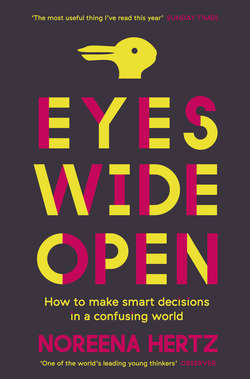Читать книгу Eyes Wide Open: How to Make Smart Decisions in a Confusing World - Noreena Hertz - Страница 41
Men in White Coats
ОглавлениеIn an age of disorder, deluge and disruption, a time when we are ever more conscious of marketers’ attempts to mislead, we crave answers and certainty. And experts sell both in spades.
Scientists, professors, doctors, lawyers, investment advisers, management consultants, specialists in a wide range of domains and fields. Men (typically) in white coats or pinstripe suits, usually grey-haired – you know who I’m talking about: the authority figures we see on our television screens or read about in our morning newspapers. The kind of people deemed ‘trusted sources’ on a particular topic, usually but not always their own. We find their utterly self-confident, parent-like aura very reassuring. When they tell us what we can and should do, or what we can’t, it’s a real relief.
I mean, ever since the Enlightenment we’ve acknowledged, haven’t we, that science and logic are supremely privileged forms of knowledge, to be much revered? And it’s experts who know the passwords that provide access to this privileged world. When an expert confidently delivers his opinion, we can almost see centuries of theories, rules, principles, experiments and formulae being channelled through him, in a special secret language that we, the non-experts, are not privy to.
We take these words of supposed wisdom at face value – we can’t understand what the experts are on about most of the time, but we nod anyway, and accept what we are hearing. Bludgeoned by their stats and theories, pacified by their institutional affiliations and the letters after their names, reassured by their self-confidence, we surrender our intellect, instincts and power to them.
They know the answers. We do what we are told. It’s a tyranny of the experts.
This is no exaggeration.
In a recent experiment, a group of adults were asked to make a financial decision while contemplating an expert’s advice. An fMRI scanner gauged their brain activity as they did so.1
The results were extraordinary: when confronted with the expert’s advice, it was as if the independent decision-making parts of the participants’ brains pretty much switched off.
An expert speaks, and it’s as if we stop thinking for ourselves. It’s a really scary idea.
Yet we don’t even suspect that there’s a problem. Indeed, studies show that the vast majority of college-educated, high-earning, informed adults, CEOs, professionals, executives – people with clout, experience, wisdom of their own, people perhaps like you and me – trust experts more than any other group in society.2
But remember how easily misled we were by Professor Miner in the previous Step …
